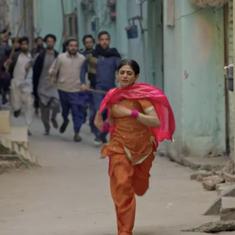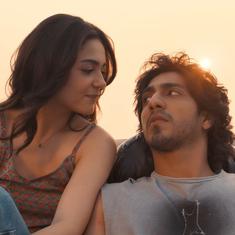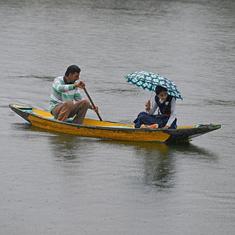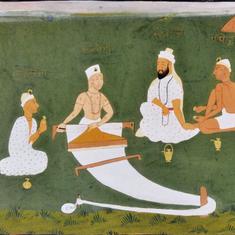Prominent among the native thiyyas of mayyazhi were Mayor Chekku Moopar, whose rosewood-black skin had not grown even a shade lighter though he had spent three decades in France, and Sergent-en-retraite Kunhikannan, who had fought wars in Indochina on the French side.
Chekku Moopar had come back to Mayyazhi with a French wife.
“What style he has!” the women remarked, looking at the stately, dark-complexioned Chekku Moopar strolling hand in hand along the street with his French wife.
Only Kurambi Amma, who adored every man in Mayyazhi who wore a coat and trousers, said wistfully: “If only he had been a little more fair-skinned.”
Unlike Leslie Sayiv, Chekku Moopar never mixed with the poor natives. No matter how many times he walked down the street, he never cast a glance at Kurambi Amma. After all, she would try to reason, he lived in France for so many years and even married a French lady, why should such a great man talk to her, coconut merchant Kelu Achan’s woman?
But Leslie Sayiv never kept the natives at a distance as Chekku Moopar did. He dressed more fashionably than Chekku Moopar and had the carriage with the best horse in Mayyazhi. And yet, he put his arm around Kelu Achan when he talked to him. Leslie Sayiv’s son, Gaston, and Kurambi Amma’s son, Damu, were inseparable companions.
Kurambi Amma’s man, Kelu Achan, never wore a coat or trousers. All he wore was a short white mundu that came up to his knees. And once he came home he took off that as well. He hated clothes. Restless by nature, he would rush around the yard, heap manure at the roots of the palms and dig channels in the courtyard so that the rainwater could flow out. He could not sit still for a minute.
Destiny had perversely willed that Kurambi Amma, who worshipped men dressed in coats and trousers, should get the mundu-clad Kelu Achan as her husband.
One night it began to pour. Gusts of wind swirled through the rain-lashed palm trees and brought down the coconuts. Kelu Achan hurried out to pick them up. The pits and furrows in the grove were filled with muddy water. Dead frogs hindered Kelu Achan at every step.
“Oh, Kurambi, something has bitten me.” Kelu Achan hopped in on one leg. Blood dripped from the heel of his left foot.
Kurambi’s heart beat fast when she saw the blood. It was during the rainy season that the snakes came out.
“Save my man.” Her eyes turned towards the cross on the steeple of the Church of the Virgin.
She brought Kelu Achan his palm leaf umbrella.
“Don’t you want your mundu?”
“In this rain? No.”
He hopped on one leg all the way to Malayan Kadungan’s house.
There was no poison that Malayan Kadungan’s magical powers could not draw out. Once a snake had bitten a Mapilla boy who lived eight miles east of Kadungan’s house. The poison had entered the child’s head. The only way to get it out was to fetch the snake that had bitten the boy. And that was what Malayan Kadungan did. Under the spell of his magic, the snake swam across the Mayyazhi river, plucked out the poison from the Mapilla boy’s head and fell dead at Kadungan’s feet.
Kadungan was often called Gulikan – the goddess’s dancer – because he performed the Gulikan’s role at the Thira festival. Kadungan stood expectantly on the veranda.
He had just had a bath, changed and smeared vibhuti over his forehead.
“I was waiting for you, Kelu Achan.” Kadungan knew in advance whom a snake would bite and when.
Kelu Achan hopped on to the veranda leaving a trail of bloodstains on the wet floor. He sat down on the grass mat. Kadungan chanted the naga mantram over him.
“You can go now. But remember, you mustn’t sleep for twenty-four hours. If you do, nothing will save you.”
Kelu Achan nodded, took a half-anna coin out of his ear and gave it to Kadungan.
But Kelu Achan did not get back home. He fell down on the way and died.
“Oh my God, my Thiyyan has left me, he’s gone away …” Kurambi wailed for many days and nights. Gradually, her wails quietened to a gentle sobbing. Finally, she resigned herself to her fate.
“If only he had been a little more fair-skinned,” she began to say as usual as she watched admiringly while Chekku Moopar walked down the street holding his wife’s hand.
Clement Sayiv gave his wine free only to policemen. But there was hardly anyone in Mayyazhi who had not been invited to savour Leslie Sayiv’s wine. He entertained visitors constantly and loved giving presents. On festive days like Christmas and Quatorze Juillet he served food to the poor people in the dharmasala and showered them with gifts.
Missie bore Leslie two children, Albert and Gaston. Kurambi Amma’s son Damu was born the same year as Gaston.
Albert grew up to be a vagrant. He insulted his teachers and ran away from school. Then he took to drinks and women. He joined the French army when war broke out. No one heard of him after that.
Missie’s blue eyes used to fill with tears. “It’s my fate, Kurambi,” she would say.
Some said Albert had died in the war, others that he had drowned in a boat disaster on the high seas. There was a rumour that he was living contentedly in France with a wife and children.
“I saw him in Saigon,” said Sergent Kunhikannan.
“Are you sure, Monsieur?”
“I saw him with my own eyes. In the Rue de la Place, holding a bottle in his hand and singing loudly.”
“I don’t care where he is as long as he’s alive.” Missie wiped her eyes. Maybe Albert was a drunkard and too fond of women. Maybe he did not care for his family. But Missie would always love him, whether he was in Saigon or in some far corner of the earth. It was a relief to know he was alive.

Excerpted with permission from On The Banks of the Mayyazhi, M Mukundan, translated from the Malayalam by Gita Krishnankutty, HarperCollins India.










